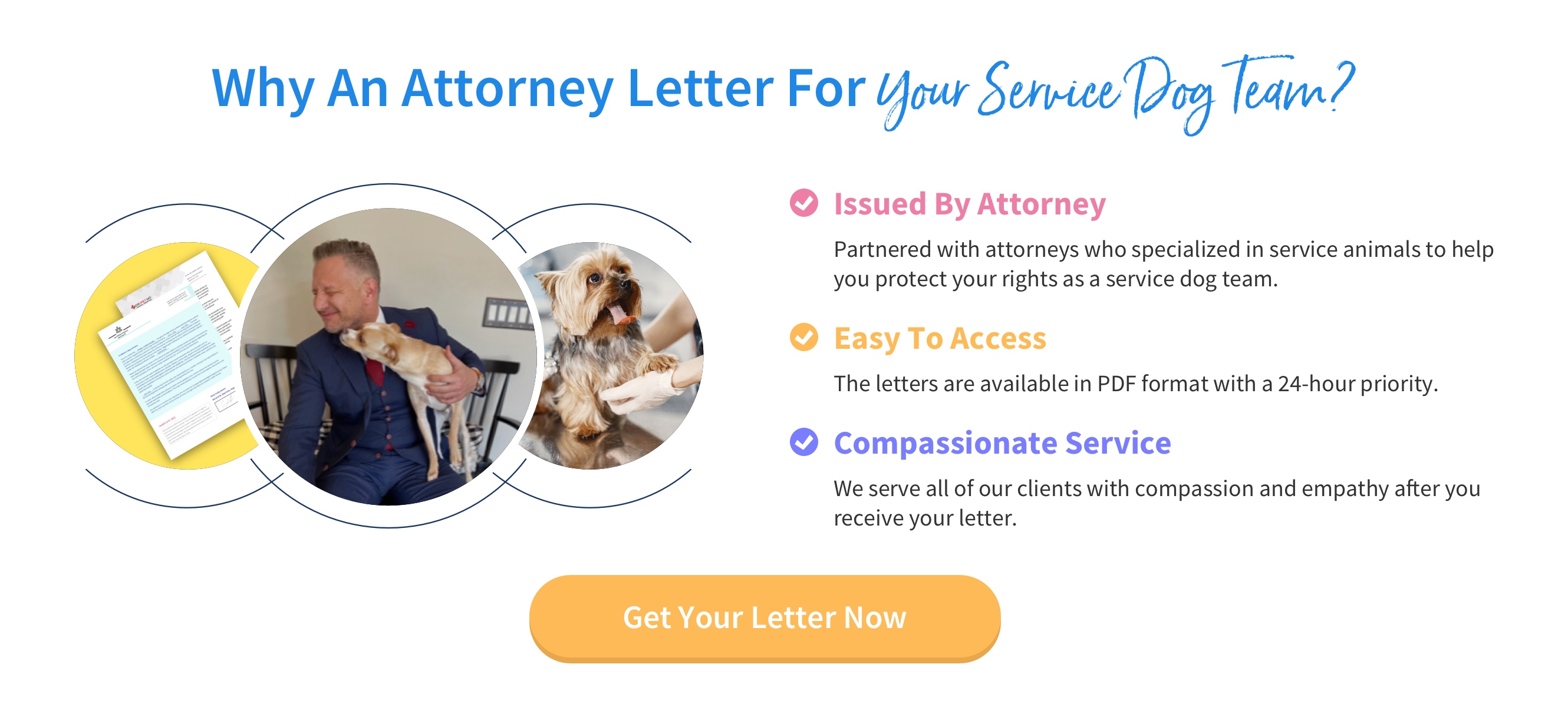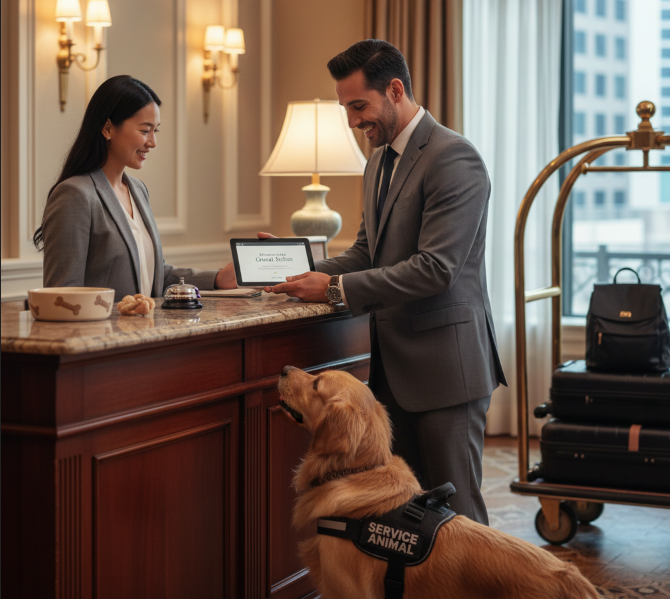- What Are Psychiatric Service Dogs?
- What Is a Psychiatric Service Dog Letter?
- Who Can Issue a Psychiatric Service Dog Letter?
- Can You Be Required to Present a Psychiatric Service Dog Letter for Housing?
- Can You Be Required to Present a Psychiatric Service Dog Letter for Accommodation in the Workplace?
- Can You Be Required by Airlines to Present a Psychiatric Service Dog Letter?

Living in a digital era, where getting access to all types of information has become scarily easy, it is essential to protect our privacy and personal space. It is understandable and normal to not feel comfortable sharing everything about yourself with the world and sometimes even with your close ones.
When it comes to mental health issues, social awareness has increased in the last few years, however, many people still hesitate to openly share information about the problems they experience with their mental health, mainly due to the fear of not being understood or even being judged by the public.
Some individuals, experiencing mental health problems, decide to seek alternative ways of support outside the standard medicine, such as the assistance of a Psychiatric Service Dog. While the assistance of service dogs, including psychiatric dogs, is tremendous, there are certain challenges that service dog handlers face on a daily basis.
These challenges are often related to the status of the dog being questioned by employees, landlords, airline agents, etc. Sometimes, a medical letter may also be required.
Isn’t it illegal to require any personal information, especially disability-related ones?
Today, we will talk about an important and sensitive topic, namely, psychiatric service dog documentation, including how to obtain it, whether you can be required to provide it or not, and why it is important to have it.

What Are Psychiatric Service Dogs?
Psychiatric Service Dogs are service animals who are individually trained to perform specific tasks directly related to a mental disability including anxiety, depression, PTSD, schizophrenia, bipolar disorder, etc.
It is crucial to clarify that mental conditions make a legitimate reason to get a service dog and that psychiatric dogs do not provide comfort only. There is still a lot of misinformation surrounding these dogs, and they often are considered equal Emotional Support Animals (ESAs).
Unlike ESAs, Psychiatric Service Dogs can perform a wide range of tasks such as alerting to anxiety episodes, providing Deep Pressure Therapy and other forms of tactile stimulation, retrieving items, reminding their owners to take medication, crowd control, etc. PSDs perform specific tasks, and not comfort only.

What Is a Psychiatric Service Dog Letter?
This document confirms that an individual has a mental health condition whose symptoms can be eased by the assistance of a service dog. In other words, it serves as both a verification of eligibility for a service dog and a recommendation for one.
We explicitly note that a psychiatric service dog letter is not supposed to disclose personal information, including details about a person’s disability. Instead, it is used as a confirmation that an individual can benefit from a service animal.
With that being said, you should not worry that a Psychiatric Service Dog letter will reveal details about yourself that you do not want to share.
Additionally, medical documentation may reference legal protections under relevant service dog laws, based on your location, such as the Americans with Disabilities Act (ADA) and the Equality Access Act 2010.
Who Can Issue a Psychiatric Service Dog Letter?
This type of documentation can be issued only by licensed healthcare providers, such as psychiatrists, therapists, general practitioners, nurses, etc., who are familiar with the individual’s mental health condition.
It is important to clarify that trainers and dog training organizations can not provide such documentation. In some cases, training schools work with licensed health professionals and can facilitate the connection between individuals looking for medical documentation for their service dogs and healthcare providers.
However, a dog training facility itself is not licensed to issue medical documentation.
If you are looking for a psychiatric service dog letter, the best way to proceed is to contact your psychiatrist/psychologist or any professional you may be visiting. Alternatively, you can reach out to your GP, who also can issue this document or at least direct you to a relevant specialist.

Can You Be Required to Present a Psychiatric Service Dog Letter for Housing?
Those who have already done their research, know that under the Americans with Disabilities Act (ADA), employees can only ask two questions to verify the legitimacy of a dog as a service dog:
1. Is this a service dog due to a disability;
2. What tasks the dog has been trained to perform?
This is indeed correct! When it comes to requesting reasonable accommodation for a service dog, though, things may be a bit different. According to a document, called “Assessing a Person’s Request to Have an Animal as a Reasonable Accommodation Under the Fair Housing Act,” which replaces HUD’s 2003 notice:
“Some websites sell certificates, registrations, and licensing documents for assistance animals to anyone who answers certain questions or participates in a short interview and pays a fee.
Under the Fair Housing Act, a housing provider may request reliable documentation when an individual requesting a reasonable accommodation has a disability and disability-related need for an
accommodation that are not obvious or otherwise known.”
In HUD’s experience, such documentation from the internet is not, by itself, sufficient to reliably establish that an individual has a non-observable disability or disability-related need for an assistance animal.
By contrast, many legitimate, licensed health care professionals deliver services remotely, including over the internet.
One reliable form of documentation is a note from a person’s health care professional that confirms a person’s disability and/or need for an animal when the provider has personal knowledge of the individual”.
“Reasonably supporting information often consists of information from a licensed health care professional – e.g., physician, optometrist, psychiatrist, psychologist, physician’s assistant,
nurse practitioner, or nurse – general to the condition but specific as to the individual with a disability and the assistance or therapeutic emotional support provided by the animal.
• A relationship or connection between the disability and the need for the assistance animal must be provided. This is particularly the case where the disability is non-observable, and/or the animal provides therapeutic emotional support.
• For non-observable disabilities and animals that provide therapeutic emotional support, a housing provider may ask for information that is consistent with that identified in the Guidance on Documenting an Individual’s Need for Assistance Animals in Housing (*see Questions 6 and 7) in order to conduct an individualized assessment of whether it must provide the accommodation under the Fair Housing Act. The lack of such documentation in many cases may be reasonable grounds for denying a requested accommodation”.
In summary, we can say that a landlord can ask for supporting information/documentation to provide reasonable accommodation to a service dog, especially if the tasks the service dog has been trained to perform are not immediately obvious.
However, extensive information about the person’s disability and medical records can not be required.
“Disclosure of details about the diagnosis or severity of a disability or medical records or a medical examination cannot be required. “

Can You Be Required to Present a Psychiatric Service Dog Letter for Accommodation in the Workplace?
Yes, you can. Let’s see what the law says!
“According to the Equal Employment Opportunity Commission (EEOC) and Title I of the ADA, each request for a reasonable accommodation must be considered on a case-by-case basis. This section reviews the phases of the reasonable accommodation process. The first step in the reasonable accommodation process is disclosure of a disability, as employers are only required to accommodate disabilities of which they are aware. It is important to note that the process must be interactive, with participation by both the person with a disability and the employer, so that an effective solution may be agreed upon”.
“Who is an “individual with a disability?
An individual meets the Americans with Disabilities Act definition act of “disability” that would qualify them for reasonable accommodations if they have “a physical or mental impairment that substantially limits one or more major life activities (sometimes referred to in the regulations as an “actual disability”).” If a disability is not obvious to an employer, they can ask for medical documentation from a health care provider to confirm the need for an accommodation.”
Again, we need to clarify that personal information or any extensive medical records can not be required. Also, any medical information provided by employees is considered confidential.
Title I of the ADA also covers:
“Medical Examinations and Inquiries
Employers may not ask job applicants about the existence, nature, or severity of a disability. Applicants may be asked about their ability to perform specific job functions. A job offer may be conditioned on the results of a medical examination, but only if the examination is required for all entering employees in similar jobs. Medical examinations of employees must be job-related and consistent with the employer's business needs.
Medical records are confidential. The basic rule is that with limited exceptions, employers must keep confidential any medical information they learn about an applicant or employee. Information can be confidential even if it contains no medical diagnosis or treatment course and even if it is not generated by a health care professional. For example, an employee's request for a reasonable accommodation would be considered medical information subject to the ADA's confidentiality requirements.”

Can You Be Required by Airlines to Present a Psychiatric Service Dog Letter?
If you plan to travel with your psychiatric service dog, especially internationally, please familiarize yourself with local laws first and check the import requirements. Additionally, it is highly recommended to review the service dog’s policy of the airline you will be flying on and contact its agents in advance.
Keep in mind that airlines and airports operate as separate entities. This means that even if an airline accepts your dog for a specific itinerary, it does not guarantee that the dog will be automatically cleared at the border. Also, some countries require mandatory quarantine, so please make sure to review all the regulations and documentation that you may be required to provide.
When it comes to medical documentation for a psychiatric service dog, let’s see the U.S. Department of Transportation’s Final Rule on Traveling by Air with Service Animals:
“The Department agrees with commenters who expressed the view that it is inappropriate to allow airlines to impose greater burdens on psychiatric service animal users than on
individuals who utilize service animals that are trained to do work or perform tasks for the benefit of individuals with physical or other types of disabilities.
Accordingly, the Department will no longer draw a distinction between psychiatric service animal users when traveling in air transportation and other service animal users. This means that psychiatric service animals will be subject to the same regulations as other service animals.
Most notably, psychiatric service animal users will no longer be required to provide a letter from a licensed mental health professional detailing the passenger’s need for the animal, nor will they be required to check in one hour before the check-in time for other passengers”.
You can find the full text here:
As explained above, regulations may vary, and so do airlines’ policies. If you will be using a non-US airline, make sure to carefully check its policy, as airlines often differentiate between their service dog policies for direct flights to/from the US and to/from other countries.
We hope this information will help you prepare properly and have a great time with your psychiatric service dog as a team!











